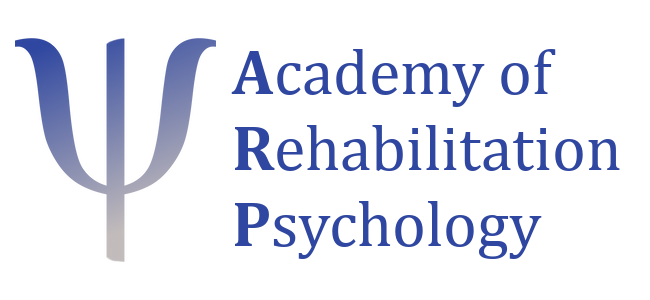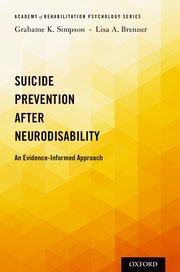Oxford University Press
Academy of Rehabilitation Psychology Series
Series Editor: Lisa A. Brenner, Ph.D., ABPP(Rp)
Disability as Diversity: Developing Cultural Competence
Erin E. Andrews
First book to comprehensively address disability as diversity and expose readers to disability as a distinct cultural experience
Goes beyond disability models to explore disability identity development, disability culture, microaggressions, and culturally appropriate language
Provides specific cultural considerations for psychological testing and assessment, as well as psychological intervention and research
Understanding the Experience of Disability: Perspectives from Social and Rehabilitation Psychology
Edited by Dana S. Dunn
Includes up to date research on social psychological perspectives on disability
Covers classic, current, and nascent topics linked to disability
Explores the experience of an often overlooked but sizable group--people with disabilities
Suicide Prevention after Neurodisability: An Evidence-Informed Approach
Grahame K. Simpson and Lisa A. Brenner
Examines how to assess and prevent suicide in progressive neurological disorders Investigates suicide and prevention among veterans with traumatic brain injury
Explores suicide after eight neurological disorders: stroke, spinal cord injury, traumatic brain injury, amyotrophic lateral sclerosis, epilepsy, Huntington's disease, multiple sclerosis, and Parkinson's disease
Validity Assessment in Rehabilitation Psychology and Settings
Dominic A. Carone and Shane S. Bush
The only book focusing directly on validity assessment in rehabilitation contexts
Expertly crafted by two seasoned, board-certified psychologists experienced in clinical neuropsychology and rehabilitation psychology
Illuminates the importance of validity assessment and methods in rehabilitation psychology
Highlights include: managing invalid presentations, mild traumatic brain injury, forensic and disability applications, and ethical considerations
Tailored to the rehabilitation psychologist learning about validity assessment; students and trainees; or experienced psychologists and neuropsychologists
Disability-Affirmative Therapy A Case Formulation Template for Clients with Disabilities
Rhoda Olkin
D-AT is a practical approach that walks readers through a template of nine factors to inquire about with clients with disabilities
Represents a hybrid of two fields - disability studies and clinical psychology
Olkin's insider perspective is apparent in the nonpathologizing of disability, and in infusing disability culture into understanding of clients with disabilities
Unique in addressing clinical work using a disability studies perspective
The Social Psychology of Disability
Dana Dunn
First book to systematically review, update, organize, and critique the literature on the social psychology of disability in 30 years
Designed to be a resource for clinicians and other professionals who want to become aware of factors that promote or inhibit communication and understanding between people with disabilities and nondisabled individuals
Can also be used as a text in advanced undergraduate or graduate training courses, and for training health care workers and caregivers
Ethics Field Guide Applications to Rehabilitation Psychology
Thomas R. Kerkhoff and Stephanie L. Hanson
Field-tested ethics analysis model
Two case example presentation formats: quick reference guide or detailed analysis
Emphasis upon contextual factors that bring dimensionality to the cases and characters
Learning opportunities in each chapter that allow the reader to further explore ethical issues
Critical Care Psychology and Rehabilitation
Kirk J. Stucky and Jennifer Stevenson Jutte
Presents an overview on the integration of psychology and rehabilitation in critical care settings
Provides considerations for treatment across the lifespan
Illustrates ways to navigate barriers to establishing integrative care models across a variety of settings
Motivational Interviewing in Medical Rehabilitation
Nicole Schecther, Connie Jacobs, Lester Butt, and Stephen Wegner
Chapter authors are from a variety of rehabilitation disciplines, including medicine, psychology, nursing, occupational therapy, physical therapy, speech language pathology, and social work
Provides an overview of MI principles, skills, and applications in medical rehabilitation and also takes a deeper dive into the most commonly observed barriers to patient engagement in these settings
References a set of MI training video demonstrations specific to rehabilitation, which are available for free on www.rehabengage.org
The first volume of its kind to describe applications of MI to the medical rehabilitation field










